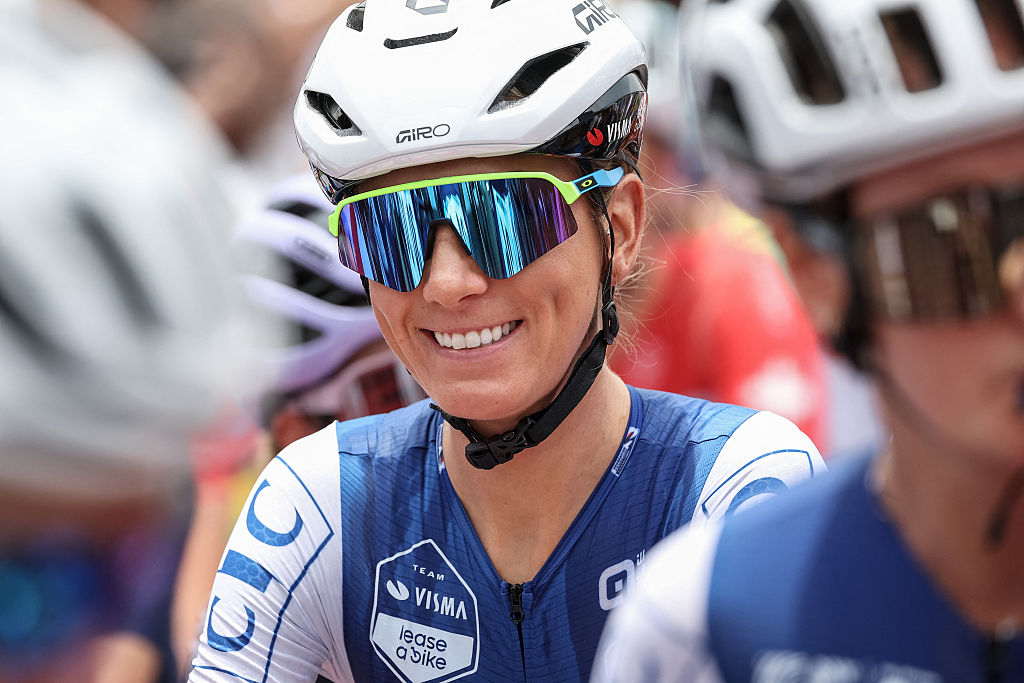Emulating Il Campionissimo – Tadej Pogačar, Fausto Coppi and two vastly different paths to Il Lombardia immortality
An in-depth look into the context of Coppi's five victories and how the reigning World Champion arrives at his next date with history to try and match the Italian's record
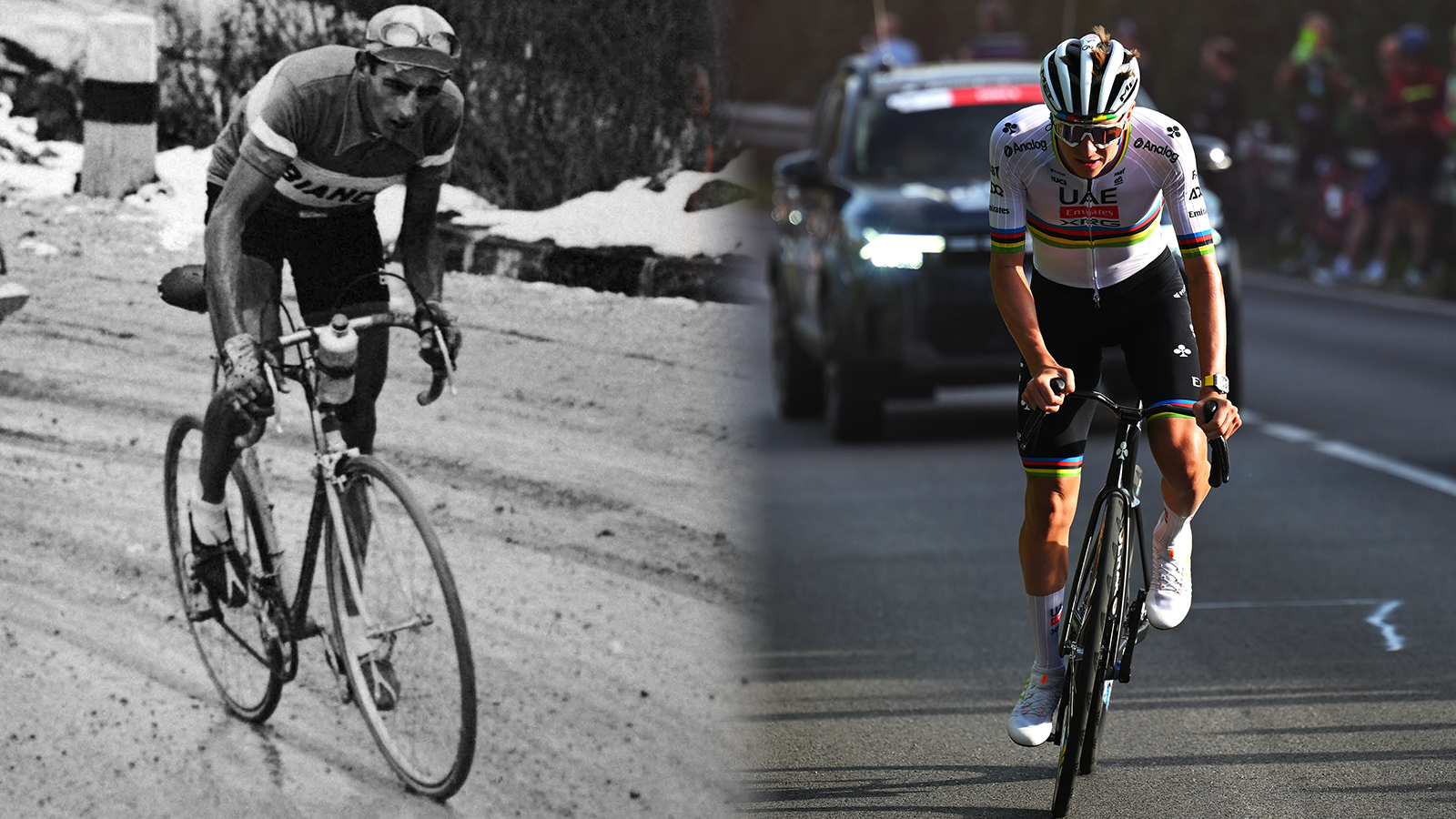
The latest race content, interviews, features, reviews and expert buying guides, direct to your inbox!
You are now subscribed
Your newsletter sign-up was successful
Road cycling’s icons of yesteryear live on in legendary stories and historic records that both recount and demonstrate their highest of highs, lowest of lows and achievements that withstand the test of time. Most fans of the sport love such rich histories of the past and champion the figures whom we only get to hear about in semi-mythical recountments or black and white photos.
However, as we get further away from the eras these heroes of the sport once dominated, the rising obsession with stats, watts per kilo and climbing records could threaten to trivialise the status of the great riders who laid the foundations for the stars of today.
This Saturday, a rider who is fast becoming an all-time great, Tadej Pogačar, has yet another date with history, to try and equal the record of five Il Lombardia wins held by Fausto Coppi.
It’s a bid to surpass Il Campionissimo (the Champion of Champions), as last season Pogačar already managed to equal the feat of winning four Lombardias in four straight attempts as Coppi did in the 1940s. 2025 would be his fifth in succession. It would lift the Slovenian up to an even higher level of sporting immortality at the Monument that only Coppi and Alfredo Binda - the only other winner of four, like Pogačar - enjoyed before his arrival.
But when it comes to comparing different eras, there's a risk in simply listing previous winners in terms of numbers of victories, given that if you only use win-counts to try to equate what Pogačar will likely do at the weekend with Coppi's achievements, the historical context and impact of the Italian's immense triumphs are perhaps forgotten.
Now this is not to belittle the achievements of Pogačar and his ability to return racing to previous types of victories that only Coppi and Eddy Merckx - the top racer to whom Pogačar is so often compared - could dream of pulling off. After all, Pogačar is doing things that even those before him couldn't manage, like winning the Tour de France and World Championships two years in a row, for example. Rather, as he rips into a fifth Il Lombardia title charge, it's worth taking a good look back at the rider he is set to emulate.
Assuming Pogačar succeeds on Saturday, the first thing to notice is that Coppi and Pogačar had vastly different approaches to their fifth victory at The Race of the Falling Leaves. But both are important in the overall story of cycling and need to be considered when comparisons between the two are made.
A full dive back into the archives of Coppi's complex and tragic rise and fall, which ended with his untimely death from malaria in 1960, aged 40, but lives on in his iconic legacy, is a task that requires a lot of attention. But William Fotheringham's 'Fallen Angel: The Passion of Fausto Coppi' and Herbie Sykes' 'Coppi: Inside the Legend of the Campionissimo' are certainly both good places to start and hear Copp's epic story through those who outlived him. The former, too, provides the basis for this look into Coppi's five crowning moments at the Giro di Lombardia from 1946-1954.
The latest race content, interviews, features, reviews and expert buying guides, direct to your inbox!
The birth of two Lombardia legacies in 1946 and 2021
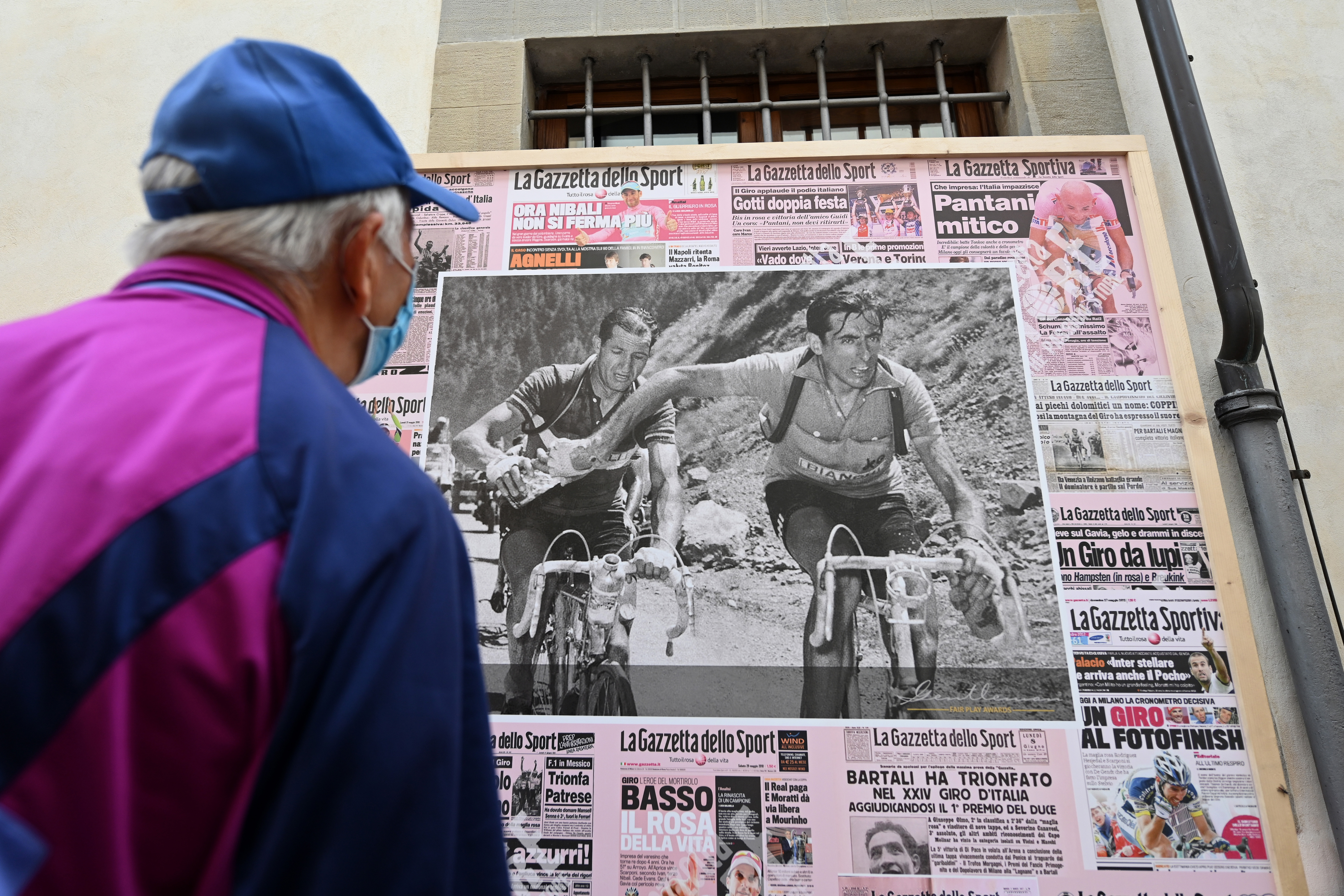
Though already a Giro d'Italia winner at 20 in 1940, Coppi’s first Lombardia victory didn't arrive until after the Second World War, when the young man's career was interrupted by active service in North Africa. Italy had actually declared war the day after Coppi's surprise first Giro win came to a close on June 9, but after being sent to Tunisia in 1943 and captured by the Allies, Coppi wouldn't race again until two years later, nor reach his previous best until 1946.
Coppi won Milan-SanRemo by an eye-watering 14 minutes, having raced much of the eight hours alone that year. But he failed to take a second Giro d'Italia as he lost out to his great rival, Gino Bartali, who played an equally vital role in the fame and fervour that followed both of Italy's greatest cycling icons for years to come. But it was no normal Giro in 1946, instead called the Giro della Rinascita by La Gazzetta dello Sport – the Giro of Rebirth – and it played a much bigger role than a mere bike race amid the end of the war and the need to bring unity to a destroyed Italy.
Once teammates at Legnano, Coppi and Bartali's legendary rivalry came to light at that aforementioned Giro in 1940, when Coppi was meant to be riding as the new top supporter of the two-time Giro and 1938 Tour de France winner, but he shocked Italy with victory. Bartali got his revenge at Il Lombardia that year when Coppi's attack at Madonna del Ghisallo – which would become a common launchpad of his in years to come – came unstuck due to stomach issues, and Bartali went past him to win. Il vecchio (The Old Man) was back on top, at least for the moment.
The pair resumed their pre-war battle and brought theatre to the rubble in 1946, with a lead Bartali gained on the road to Naples enough to hold off the charge Coppi returned with in the Dolomites. While a crazy day in Pieris on the road to Trieste takes the cake as the most memorable of the '46 Giro (look into it), by the end of it, Bartali had his revenge from MSR with overall victory by 47 seconds in Milan. Lombardia would see Coppi return the serve.
Coppi won by 40 seconds in Milan, but this wasn't without controversy as William Fotheringham recounts how third-place finisher and local rider, Michele Motta, had been paid 30,000 lire by Coppi to let him escape in the final kilometres. Long-term, this didn't impact on the legend which he'd started, though, with La Gazzetta describing it as "A win worthy of Binda or [three-time winner Costante] Girardengo."
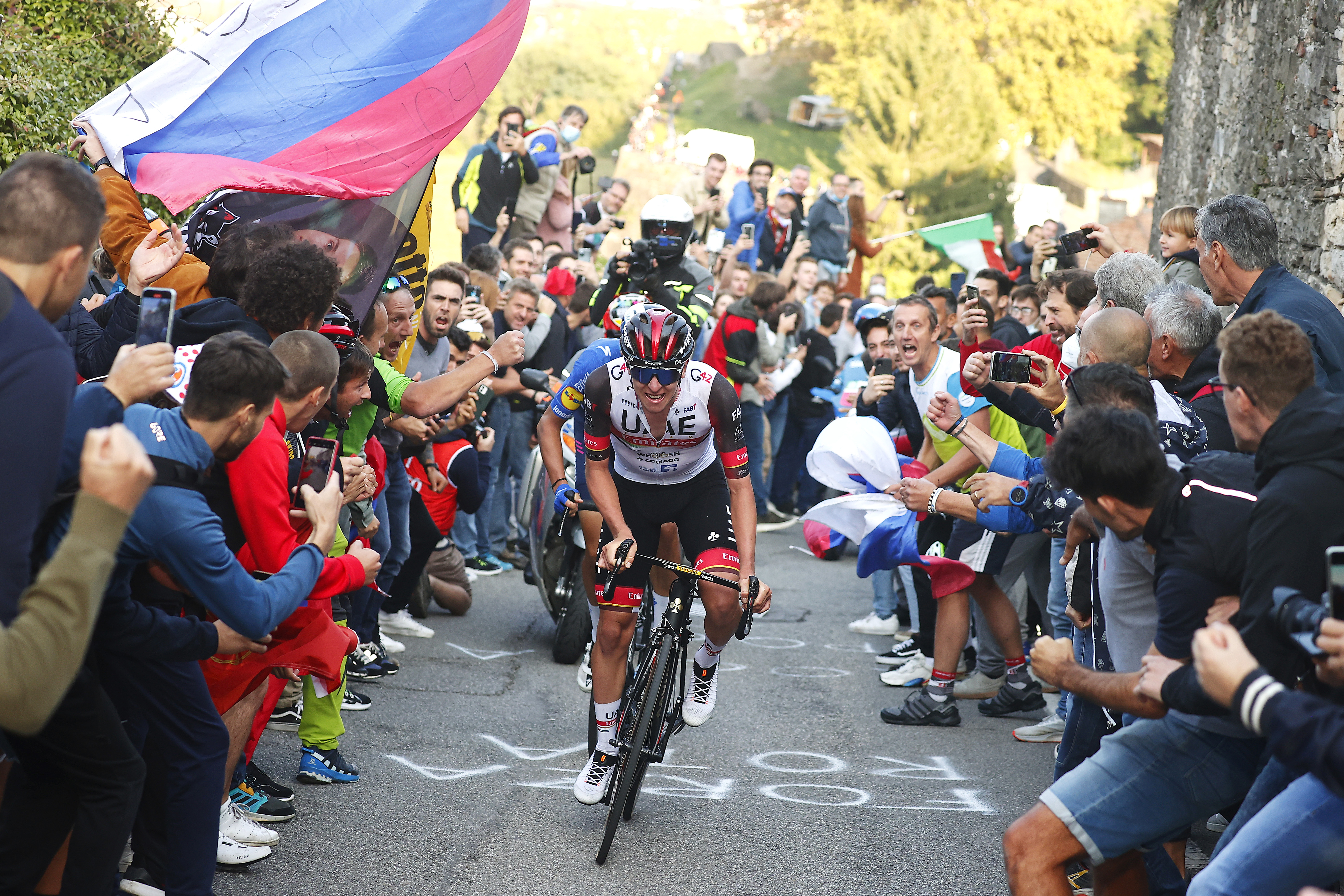
Pogačar, by contrast, did not arrive solo to his first triumph on debut at Il Lombardia in 2021. Four years younger than Coppi was at his first, the Slovenian was already a two-time Tour de France winner, and lived up to his billing at the first attempt.
He attacked on Passo di Ganda in the final 36.5km, responding to a move from a modern Italian great, Vincenzo Nibali, but he didn't stay away as Coppi 'The Heron' did back in the mid-40s. Another local Lombardy rider would play a part, though, just as Motta did for Coppi – Bergamo's Fausto Masnada – but there was no agreement, rather a challenge. Masnada descended with bravery, knowing the roads well, to catch Pogačar, but he was no match in the sprint.
Scenes at the finish saw huge celebrations for Pogačar's second Monument crown, a term that wouldn't have meant the same in Coppi's time. But its importance was the birth of another legacy, that of a Slovenian who would come to make this great Italian race his own in the years to come.
Backing it up with a second triumph
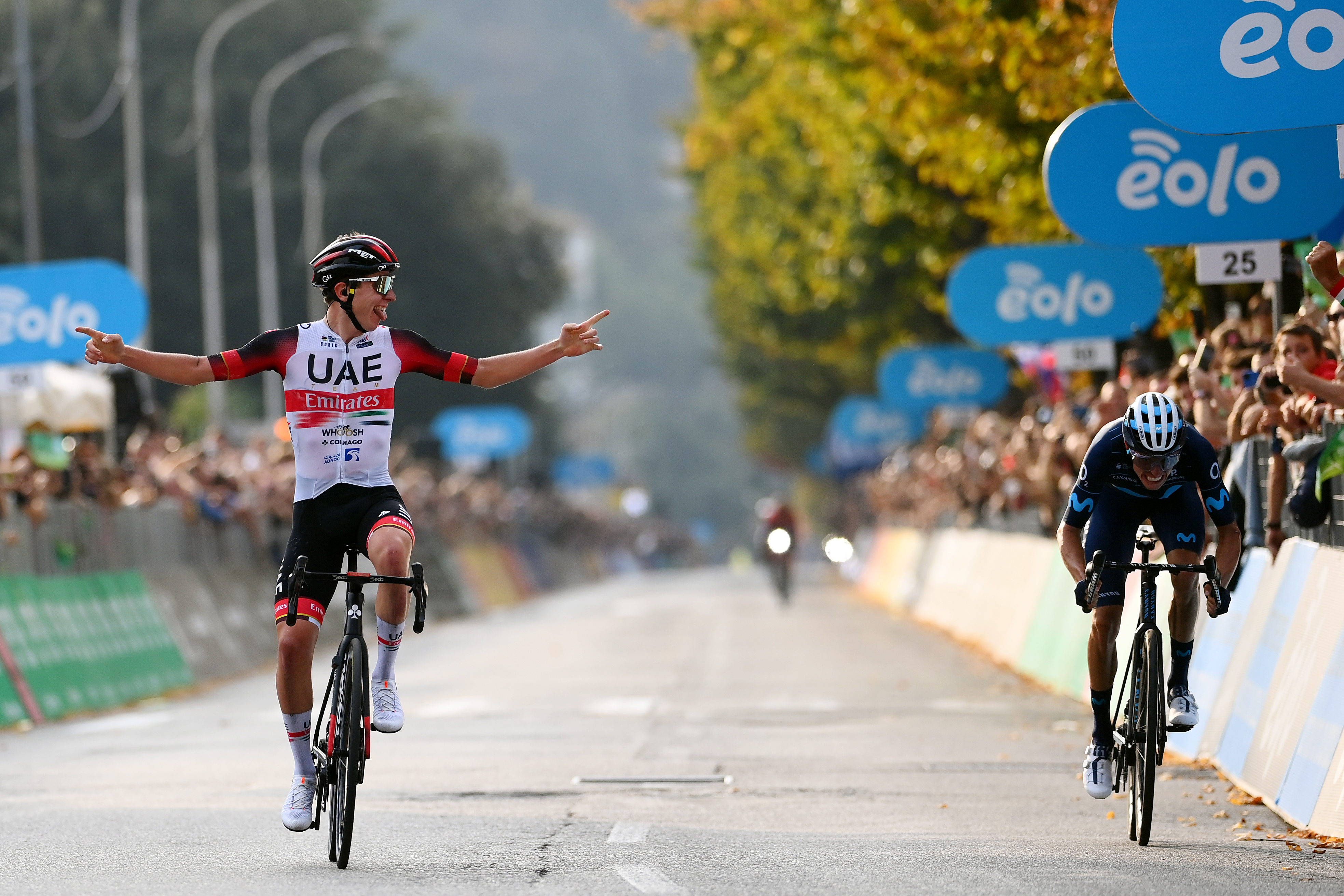
Coppi was beaten by Bartali again at Milan-San Remo in 1947, but did regain his pre-war glory at the Giro d'Italia for his second Grand Tour crown that year. Bartali had been leading for much of the middle of the race, but stage 16 from Pieve di Cadore to Trento saw Coppi take control, which he would hold all the way to Milan.
A second Lombardia crown followed four months later, with Coppi putting on one of his typical solo displays of excellence, catching Fiorenzo Magni, who would play a vital role in Coppi's final Lombardia appearance nine years later, and riding 70km solo to the victory, more than five minutes ahead of Bartali.
By this point, Coppi was already a superstar in Italy, but his best years were still to come. The same can be said of Pogačar after his Lombardia victory in 2022, the second in succession, which came after an attack in the final 20km and a two-up sprint against Enric Mas. This is not to belittle Mas, who was flying that October, but it's not quite the rivalry with another all-time great that Coppi was working against with Bartali.
Pogačar's biggest challenge in the Monuments has come from Mathieu van der Poel, with the Dutchman's spring Classics excellence preventing him from definitely winning another Tour of Flanders, taking victory on debut at Paris-Roubaix earlier this year and likely two titles at Milan-San Remo, a race which continues to elude the great Slovenian into 2026.
While not yet the dominant solo-attacking force that he would become, Pogačar had already proved he was the man for Lombardia, be that from Como or in the other direction out of Bergamo, and his outright dominance was imminent.
A near miss for Coppi as Pogačar battles with cramp
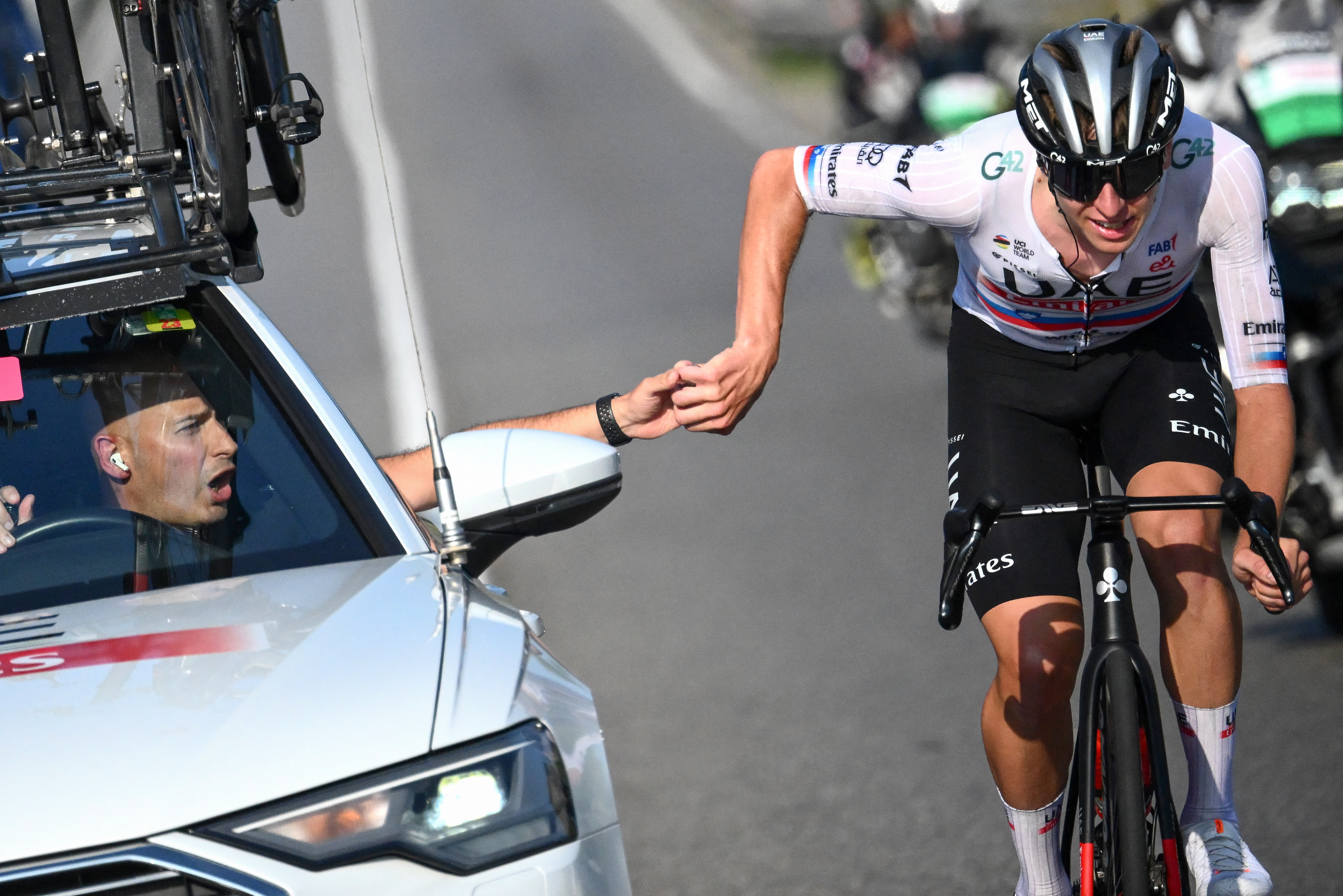
Coppi matched Binda's Il Lombardia hat-trick from the 20s with another solo victory in 1948, but it was a triumph that almost stopped before it even started, arriving in the year when he and Bartali's rivalry reached an infamous moment at the World Championships in Valkenburg.
Raced by national teams, Italy had the luxury of starting with two of the best riders in the world, but after Bartali's latest Tour de France triumph a decade after his first and a lacklustre year by Coppi's standards, "Victory for Bartali in Holland would mean the ascendency of il vecchio was absolute," writes Fotheringham.
The Giro in 1948 went amiss for Coppi after his team pulled out after stage 17, which he won. They withdrew when it came to light that race leader Magni had been helped up the climb by spectators, but was only given a light punishment that kept the maglia rosa in his grasp.
In Valkenburg, the inseparable pair marked each other, unwilling to provide any effort that would benefit the other. Belgium's Briek Schotte took victory, and the Italian federation condemned Coppi and Bartali, banning both of them for two months, having disgraced the national jersey.
Quickly rescinded, Coppi was able to return to competition and produce another solo exhibition at Lombardia, winning by almost five minutes, having attacked before the Madonna del Ghisallo and broken his own record up there to stay away for 80km.
Pogačar, similarly, was somewhat looking for a reprieve at the 2023 race, having missed out on several of his big appointments and lost a second Tour de France in a row to Jonas Vingegaard that July. He'd also lost all of the pre-Lombardia one-day races in Italy and crashed out of Liège-Bastogne-Liège that spring with a broken wrist.
His dominance stalled, but it returned on the roads from Como to Bergamo once more as he descended off the front in the final 30km and survived a small bout with cramp to make it to the line solo.
With the hat-trick complete and legends of the past emulated, Pogačar was back at his best, and following a change of coach, he would soon be in flying form. What followed, as it had for Coppi 75 years prior, was arguably the greatest season of all time. Javier Sola may not be for Pogačar what Coppi's blind masseur and 'sorcerer' Biagio Cavanna was for the Italian, but he has certainly extracted a new peak out of the Slovenian.
Total domination and rewriting history
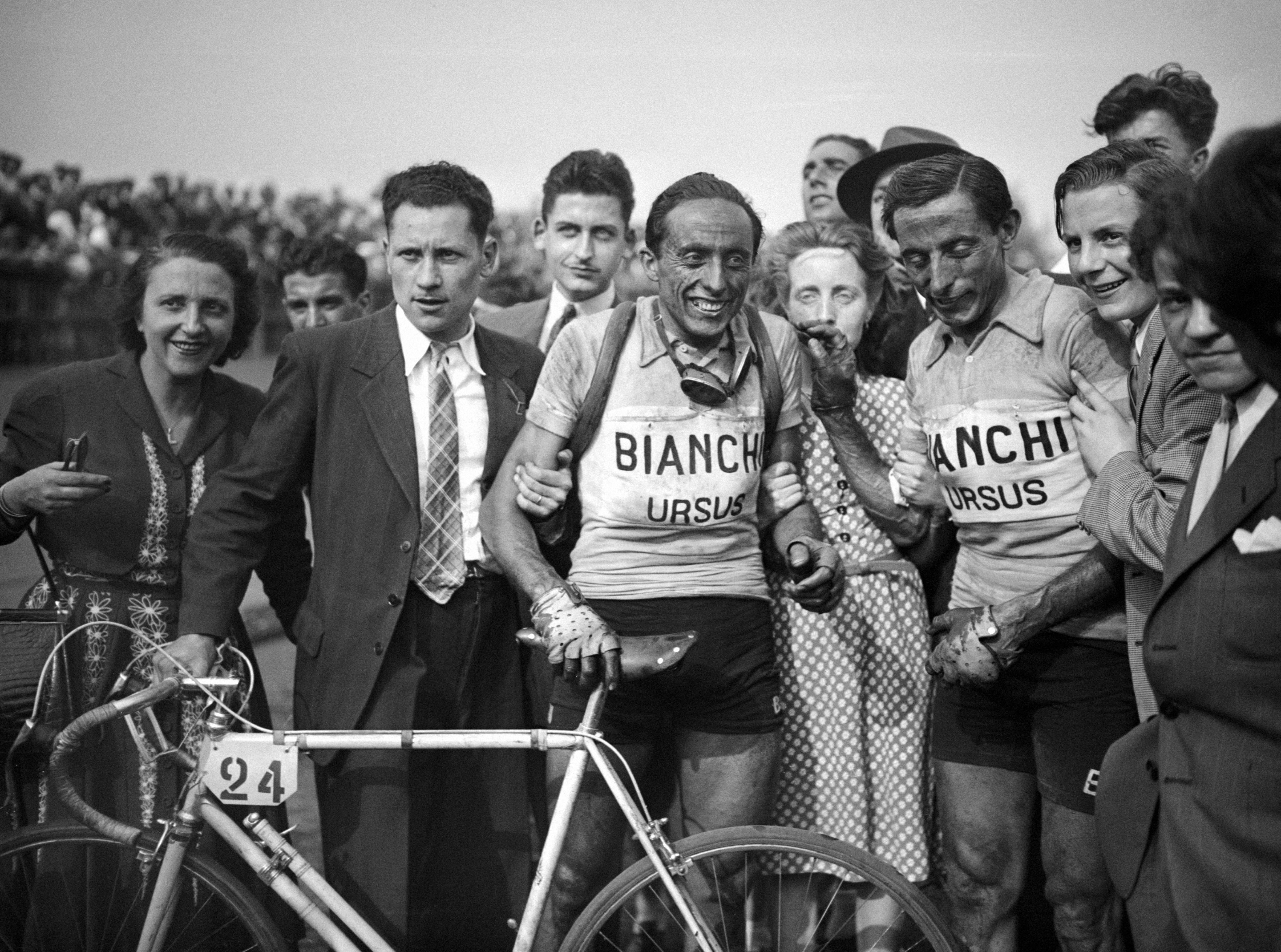
With the aftermath of Valkenburg Worlds still undermining the Italian federation, full focus was on the 1949 Tour and how Binda would fix the issue his two great stars had created – could he take or both, or would a decision between the defending champion or the debutant need to be made?
As the season raged on, it was Coppi who emerged superior, again winning Milan-San Remo solo by more than four minutes and a month later engineering a memorable victory for his beloved brother Serse Coppi at Paris-Roubaix, which he shared with André Mahé in unprecedented fashion. Controversial as it was, Fausto Coppi said he enjoyed it more than if he had triumphed himself, which he would do a year later in 1950..
It was at the Giro d'Italia, though, where Coppi moved ahead of his ageing rival and put on a memorable display to again win the pink jersey. With massive public interest, Magni as the defending champ and Bartali again to contend with, Coppi rose above all with domination on the hardest stages, the most iconic of which saw him ride 192km solo on a vicious stage from Cuneo to Pinerolo, to this day one of cycling's most epic wins.
This daring move and the time he gained at the finish, as Bartali faltered behind, won Coppi another Giro, but also saw him first be described by as "Un Uomo solo" (A man alone), by radio journalist Mario Ferretti after his crushing display – three words that would go on to define him. After this, an agreement was made for both he and his rival to race the Tour together with some of their own domestiques each, under strict instructions from national coach Binda not to sully their own or Italian cycling's reputations.
While his Tour debut took a hit in St Malo and Coppi's head dropped, which was a theme of his career – requiring the assurance and strength of others to carry him through hard times – Coppi did eventually rally from his large deficit. He put on a display that Fotheringham describes in great detail as "stage racing at its finest" in a dramatic comeback, which eventually saw him overcome the challenge from Bartali and win by more than 10 minutes in Paris.
History was made as what became a fabled Giro-Tour double had its first winner, Fausto Coppi, forever the first to complete the impossible task in 1949. He backed it up with another solo triumph in Lombardia to close out an epic season, rewriting the history books with a fourth in a row.
That famous quadruple would not be repeated until 2024 when Pogačar lined up for his most dominant performance yet at Il Lombardia, and produced the biggest winning margin since Merckx had lit up northern Italy in 1971. Remco Evenepoel started as the would-be challenger, but even the Olympic Champion was no match as Pogačar scorched away with 48km to go.
It also capped off Pogačar's finest season of dominance, so far, which matched those from the past century, as the eighth man to complete the Giro d'Italia-Tour de France double, and first since Pantani in 1998, but also the first Triple Crown winner since Stephen Roche, adding the World Champion's jersey to his already overflowing list of achievements. All-time great status was achieved by both men in '49 and '24.
Failed attempts, a sprint for a fifth crown and a worthy successor
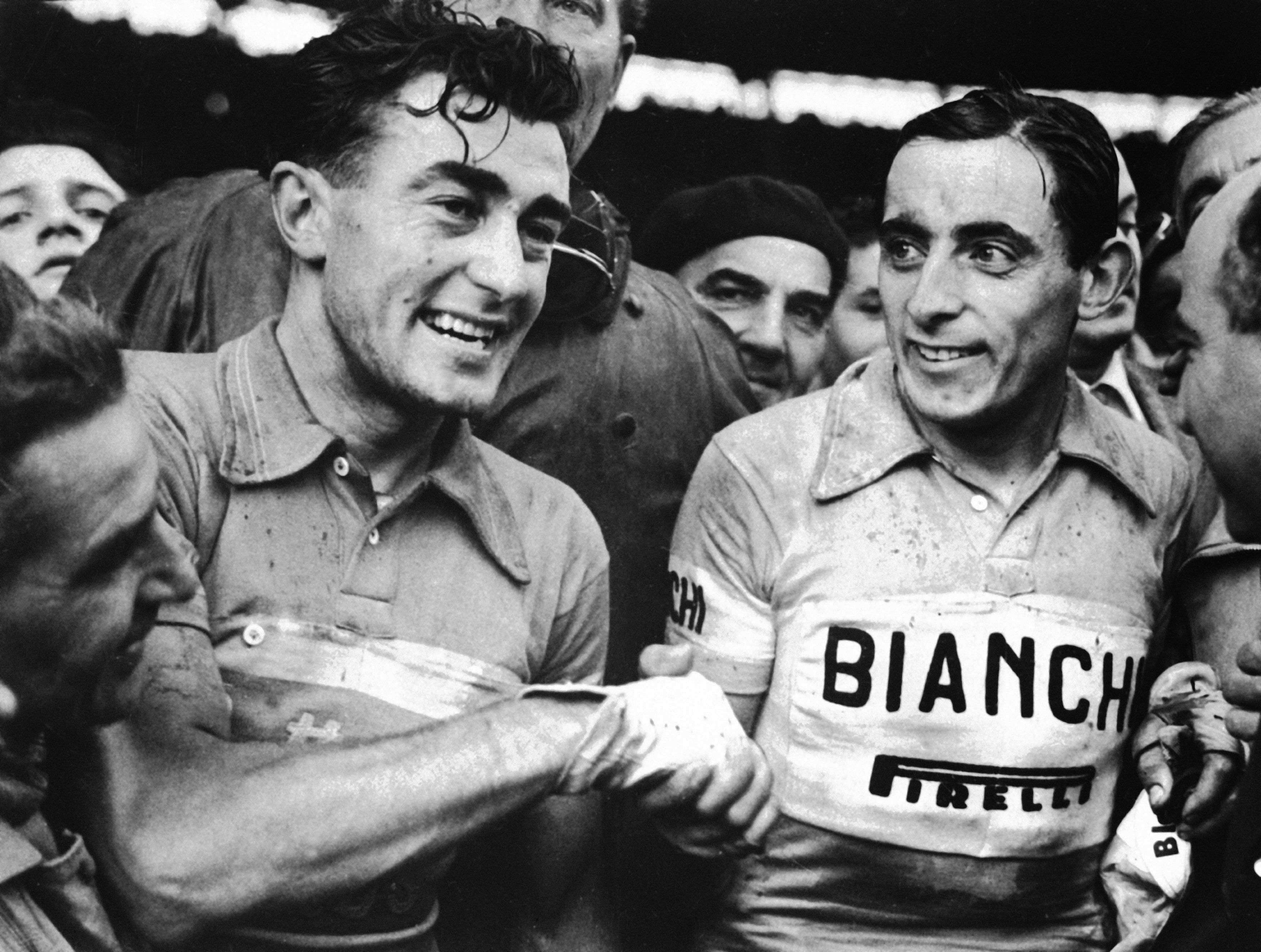
The 1950s brought with them the start of Coppi's decline, not only to his powers on the bike, but also his reputation. His extramarital affair with Giulia Occhini, who became known as "La Dama Bianca" (The White Lady) thanks to L'Équipe journalist Pierre Chany's writing, became public and brought scandal to the great rider's life.
Tragedy followed Coppi throughout the decade, with his brittle bones making his crashes even worse, notably in 1950 when he fractured his pelvis at the Giro. At Il Lombardia, trying to make it five in a row, having only returned in September, Coppi found himself not alone in front but in the lead group; however, his chances at victory were ruined when he was held up by a slower group in the Velodromo Vigorelli. Renzo Soldani took victory and ended his streak of triumphs
Coppi remained winless for the next two editions as new star Louison Bobet won in 1951, after a broken collarbone had impacted the Italian's year. But mainly he was badly affected by the tragedy of his brother Serse's death after a crash at the Giro del Piemonte. Though he made it back to the hotel, before he could get treatment. Serse died in his brother's arms.
1952 brought the second historic Giro-Tour double of Coppi's career and a repeat of the previously unachievable feat in quite stunning fashion at 31, but Lombardia was not to be his that year, finishing well away from the leaders in 35th.
While adultery was still illegal in Catholic Italy, Coppi began his relationship with Giulia Occhini a year later in 1953, drawing condemnation from the Pope and ramping up the controversy surrounding the pair, who were both already married. Despite this, he did win the Giro d'Italia for a record fifth time that season, famously beating Hugo Koblet up the Passo dello Stelvio on its debut appearance that began the life of another cycling iconic climb. He also claimed his first and only World Championships road race title in Lugano, Switzerland.
With the scandal of his affair and leaving his wife Bruna for Occhini casting a shadow over Coppi in 1954, he arrived at Lombardia without the same form that had carried him to four in a row, and with some of the former fans who championed him now whistling at him. Unable to escape alone on the climbs he had previously, Coppi was savvy enough to win the sprint in the velodrome and sit alone as the only man to take five wins at Lombardia, a record which has stood ever since.
Pogačar will arrive at the start of Saturday's race in Como, obviously, without the controversy Coppi did. His partner, like Occhini, and fellow professional rider, Urška Žigart, will likely be at the finish as she normally is when not racing, but the pair are very much fan favourites, not a scandalous partnership by any means. Controversy has barely laid a finger on Pogačar since he rose to prominence in 2019 and has never looked back, but he's also without the injuries and decline of the great Italian.
He'll start as the World Champion and having dominated each of his past three races with solo victories, including a second world title in a row that he claimed after attacking with 106km to go and a European Championships that saw him ride 75km on his own – feats rarely seen since the years of Coppi and Merckx.
A fifth victory looks inevitable, in stark contrast to Coppi, who probably wondered after 1951 if he would ever win Lombardia again. Evenepoel looks the best challenger, but it was he who was left behind to fret in both Rwanda and the Drome-Ardèche as Pogačar did as he pleased out in front. Anything but the win would be a huge surprise.
A famous defeat and the potential future for today's leading man?
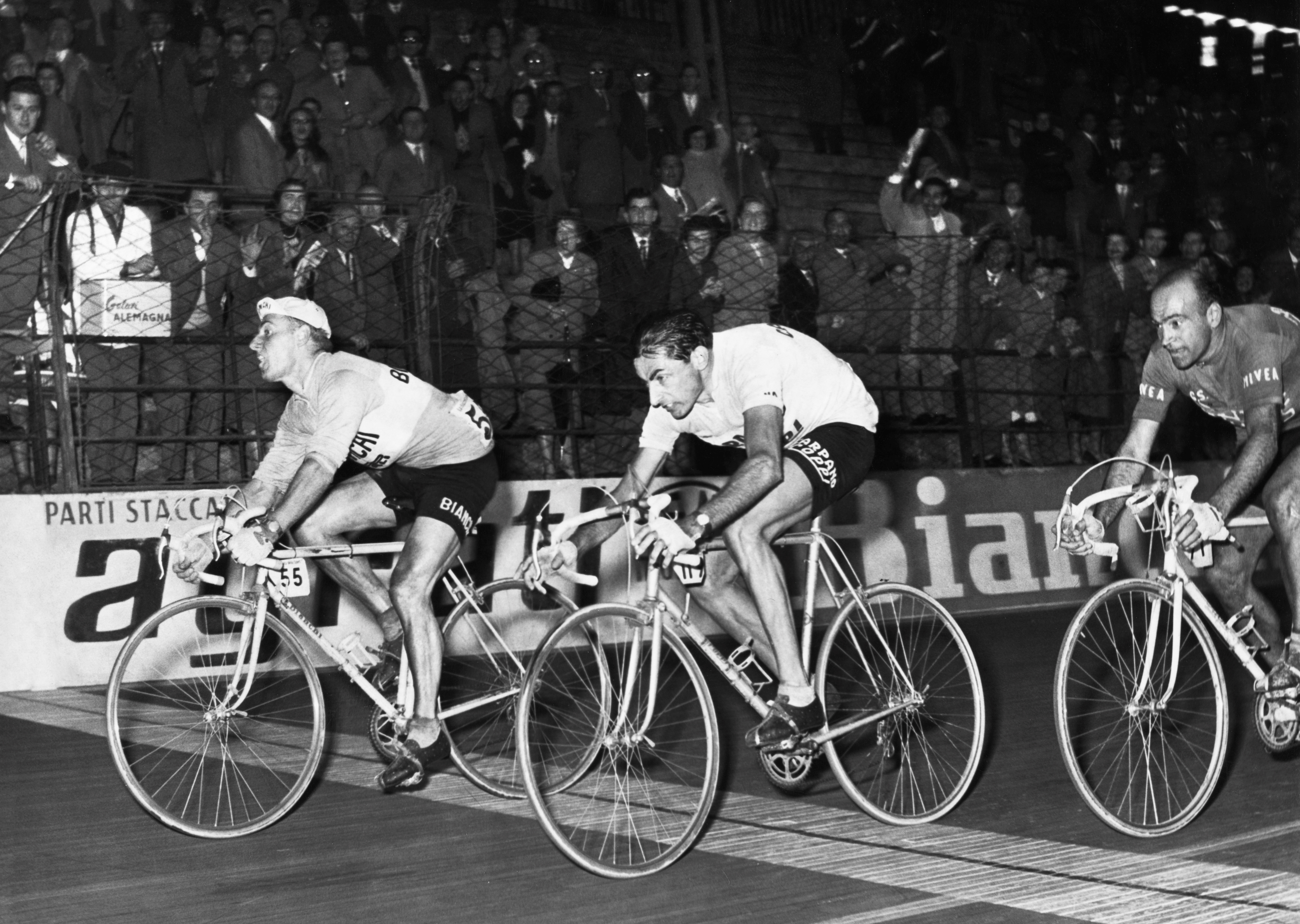
Coppi's story with Il Lombardia didn't end in triumph in 1954, but with a famous loss two years later in 1956 at the hands of a former teammate and legendary sprinter André Darrigade. That was after Magni – the man whom he'd chased down and left to win solo in 1947 – worked tirelessly to catch the lone man Coppi in front having been provoked by Occhini, burning himself out so much that he too lost the race.
It's detailed by Fotheringham as part of Coppi's decline, but also by Felix Lowe, recounting the heartbreak for Coppi, who was cheered once again by the tifosi as the tears started to fall past the finish. It wasn't the swansong that a great champion like him deserved, but that is often the way for icons of sport once their race is run.
Pogačar, while asked about it constantly, is not yet slowing down and could end up with seven or eight Il Lombardia titles when he eventually retires - which is predicted, though it's by no means certain, to be around 2030, when his current contract ends. Perhaps he, too, will experience defeat and be caught up by bad luck into his late twenties and be prevented from surpassing Coppi after all. But come what may, he also has to win a fifth first and equal Coppi before those discussions begin.
We'll never know just how much Coppi could have won should he not have missed those years in WW2, but what is certain is that his well-known modernisation of the sport, helping it move away from the turmoil of war has played a vital role in the development of the Merckx's and Pogačar's that followed. The same can be said for how teams raced for their great leaders, with Coppi's Bianchi blazing a trail from the 40s and 50s that still serves as the blueprint for the WorldTour.
It may be Merckx with whom Pogačar is so often compared, but from his solo racing panaché to the tactical nuance and the beautiful pedalling style, like true poetry in motion, he's much like Coppi, too. Il Campionissimo was certainly "A man alone" in his time, but by Saturday evening and at Il Lombardia's conclusion, he may have some company.

James Moultrie is a gold-standard NCTJ journalist who joined Cyclingnews as a News Writer in 2023 after originally contributing as a freelancer for eight months, during which time he also wrote for Eurosport, Rouleur and Cycling Weekly. Prior to joining the team he reported on races such as Paris-Roubaix and the Giro d’Italia Donne for Eurosport and has interviewed some of the sport’s top riders in Chloé Dygert, Lizzie Deignan and Wout van Aert. Outside of cycling, he spends the majority of his time watching other sports – rugby, football, cricket, and American Football to name a few.
You must confirm your public display name before commenting
Please logout and then login again, you will then be prompted to enter your display name.
